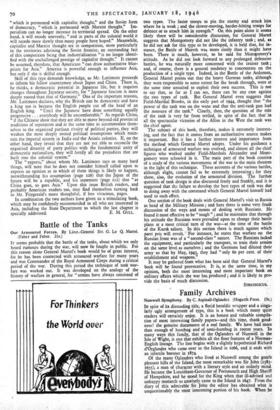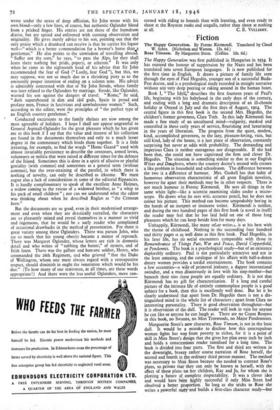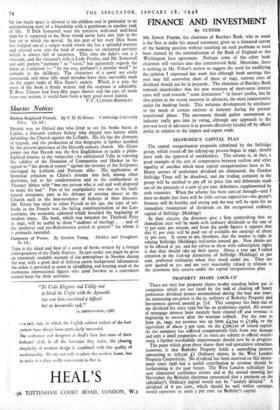Family Archives
Nunwell Symphony. By C. Aspinall-Oglander. (Hogarth Press. 15s.)
IN spite of its dissuading title, a florid heraldic wrapper and a singu- larly ugly arrangement of type, this is a hook which many quiet readers will certainly enjoy. It is an honest and valuable compila- tion of most interesting family papers—and this time, thank good- ness! the genuine documents of a real family. We have had more than enough of humbug and of semi-humbug in recent years. In many ways this family, that of the Oglanders of Nunwell in the Isle of Wight, is one that exhibits all the finer features of a Norman- English lineage. The line begins with a slightly hypothetical Richard d'Orglandes who came over to the Island in to66, and it ends with an infertile baronet in 1874.
Of the many Oglanders who lived at Nunwell among the gentle pleasant hills of the Island, the most remarkable was Sir John (1585- 1655), a man of character with a literary style and an orderly mind. He became the Lieutenant-Governor of Portsmouth and High Sheriff of Hampshire, and he stood for the King when that ill-advised and unhappy monarch so unwisely came to the Island in 1647. From the diary of this admirable Sir John the editor has obtained what is unquestionably the Most interesting portion of his book. When he
wrote under the stress of deep affliction, Sir John wrote with his own blood—only a few lines, of course, but authentic Oglander blood from a pricked finger. His entries are not those of the humdrum diarist, but are spiced and enlivened with cunning observation and originality. He gives manly advice to his son, pointing out that the only praise which a drunkard can receive is that he carries his liquor well—" which is a better commendation for a brewer's horse thaw gentleman." He also points to the unwisdom of travelling abroad. "Suffer not thy sons," he says, "to pass the Alps, for they shall learn there nothing but pride, popery, or atheism." It was only when he came to the eighteenth head of his advice that Sir John recommended the fear of God (" Lastly, fear God "), but this, we may suppose, was not so much due to a shrinking piety as to the eminently proper intention of ending on a solemn note. His advice is admirably contrasted with that of Sir John Strode, whose family was later related to the Oglanders by marriage. Strode, like Oglander, warned his son against the dangers of travel. "Rome," he said, " doth superabound in dim and idol gods, Spain in proud and profane men, France in lascivious and unwholesome women." Such, according to the editor, were the principles of "the perfect type of an English country gentleman." • Conducted excursions to the family shrines are now among the most agreeable of holidays. I hope I shall not appear ungrateful to General Aspinall-Oglander for the great pleasure which he has given me in this book if I say that the value and interest of his collection are found in the documents themselves and only to a much lesser degree in the commentary which binds them together. It is a little irritating, for example, to find the words "Home Guard" used with almost invariable persistency to describe the centoners, armed levies, volunteers or militia that were raised at different times for the defence of the Island. Sometimes this is done in a spirit of allusive or playful geniality (with commas) and sometimes as a general term (without commas), but the over-straining of the parallel, in which there is nothing of novelty, can only be described as irksome. We must regret also a lack of consideration in some of the editorial flippancies. It is hardly complimentary to speak of the excellent Anne Holmes, a widow coming to the rescue of a widowed brother, as "a whip to his pack of small children " ; nor can we understand what the editor was thinking about when he described Raglan as "the Crimean hero."
But the documents are so good, even in their modernised arrange- ment and even when they are drastically curtailed, the characters are so pleasantly mixed and reveal themselves in a manner so vivid and ingenuous, that he would be a surly reader who complained of occasional drawbacks in the method of presentation. For there is great variety among these Oglanders. There was parson John, who ate so much that his young obesity became a matter of reproach. There was Margaret Oglander, whose letters are rich in domestic detail and who writes of "tubbing the butter," of oysters, and of Irish linen. There was the gallant and humane soldier, Henry, who commanded the 26th Regiment, and who grieved "that the Duke of Wellington, whom one must always regard with a retrospective respect, should diminish in ought the veneration which would be his due." (To how many of our statesmen, at all times, are these words appropriate!) And there were the less useful Oglanders, more con- cerned with riding to hounds than with learning, and even ready to shoot at the Royston rooks and seagulls, rather than shoot at nothing at all. C. E. VULLIAMY.
Fiction
The Happy Generation. By Ferenc Kormendi. Translated by Claud W. Sykes. (Nicholson and Watson. 12s. 6d.) Rose Timson. By Marguerite Steen. (Collins. 10s. 6d.)
The Happy Generation was first published in Hungarian in x934. It has enjoyed the honour of suppression by the Nazis and has been translated into seven European languages. It is now published for the first time in English. It draws a picture of family life seen through the eyes of Paul Hegedus, younger son of a successful Buda- Pest doctor, and is a psychological study recorded in straight narrative without any very deep peering or raking around in the human heart.
Book I, "The Idyll," describes the first fourteen years of Paul's life, beginning with his babyhood in the early days of the century, and ending with a long and dramatic description of an ill-chosen holiday at Ostend in July and the first days of August, 1914. The central figure in this first book is the second Mrs. Hegedus, the children's former governess, Clara Toth. In this lady Kormendi has made a fine study of an uncultured mind—vulgarity, masked and controlled in those early years of service, flourishing and luxuriating in the years of liberation. The progress from the quiet, modest, kind, accomplished governess, to the lazy, pleasure-loving, vain, but still kind, lady of the house, is a just piece of observation, constantly surprising but never at odds with probability. The demanding and imperious Clara is neither outrageous nor disagreeable. If she had been that, she could not have captivated the firm and clever Dr. Hegedus. The situation is something similar to that in our English Wives and Daughters, where the country doctor's second wife creates a like problem in household and schoolroom. The difference between the two is a difference of humour. Mrs. Gaskell has that habit of humorous observation characteristic of all great English novelists, however far apart their methods may be in other respects. There is not much humour in Ferenc Kormendi. He sees all things in the same white light—like a scientist examining slides under a micro- scope. He draws what he sees with accurate pencil, but he does not colour his picture. This method can become unspeakably boring in the hands of an inexpert or insincere writer. Kormendi is neither, and during the two hundred pages of this first book (a novel in itself) the reader may feel that he has laid hold on one of those long pleasures which he can keep beside him for many days.
Unhappily, Kormendi, like many otlier writeib, is at his best with the theme of childhood. Nothing in the succeeding four hundred and thirty pages is as well done as this first book. Paul Hegedus, in his later life, has rib social encounters comparable with those in Remembrance of Things Past, War and Peace, David Copperfield; or Pendennis. The book is a psychological study—but of an existence deplorably ordinary. Paul is not particularly attractive and not in the least amusing, and the catalogue of his affairs with half-a-dozen dreary women provides a sordid entertainment. The book contains a few eccentrics—a wife of primeval jealousy, a dapper international swindler' and a man .disastrously in love with his step-mother—but
th beneatheir sins these people are equally ordinary. It is not that KOrmendi has no gift for characterisation. If a long and careful picture of the intimate life of entirely commonplace people is a good subject for a book, then this is excellently well done. But let it be clearly understood that apart from Dr. Hegedus there is not a dis- tinguished mind in the whole list of characters ; apart from Clara no interesting personality. There is good observation throughout—but it is observation of the dull. The reader will look in vain for anyone he can like or anyone he can laugh at. There are no Count Rostovs in this book, no Swamis, no Miss Trotwoods, no Major Pendennises.
Marguerite Steen's new character, Rose Timson, is not in the least dull. It would be a mistake to disclose how this unscrupulous woman fights her way from poverty to riches, for it is a point of skill in Miss Steen's design that she gives her plan away inch by inch and holds a conscientious reader tantalised for a long time. The book is divided into four parts. The first and third are written in the downright, breezy rather- coarse narration of Rose herself, the second and fourth in the ordinary third person manner. The method was necessary to Misi Steen because she needed to contrast Rose's plans, so. private that theycan only be known to herself, with the effect of these plans On her children, Kay and Jo, for whom she is plotting a future of complete respectability. It was a clever idea and would have been _highly successful if only Miss Steen had obseived a better proportion. So long as she sticks to Rose she writes a powerful stOrand builds a first-class character study—but
far too much space is allowed to the children and in particular to an unconvincing story of a friendship with a gentleman in another, rank of life. If Dick Somervell were the sensitive well-read well-bred man he is supposed to be, Rose would never have met him in the fast set in which she moved. In this part of her story Miss Steen has stepped out of a vulgar world where she has a splendid mastery and crossed over into the land of romance, an enchanted territory which is always full of surprises. This time the duke's son is a viscount, and the viscount's wife is Lady Perdita, and Mr. Somervell not only prefers " perfume " to "scent," but apparently regards the latter as a solecism (— "by the way, perfume's a prettier word" he remarks to the children). The characters of a novel are easily punctured, and these silly small mistakes leave their inevitable mark on the upper ranks of Miss Steen's society. Which is a pity, for most of the book is firmly written and the suspense is admirable. If Rose Timson had been fifty pages shorter and the cuts all made from one section, it would have been a very good novel indeed.
V. C. CLINTON-BADDELEY.




























 Previous page
Previous page